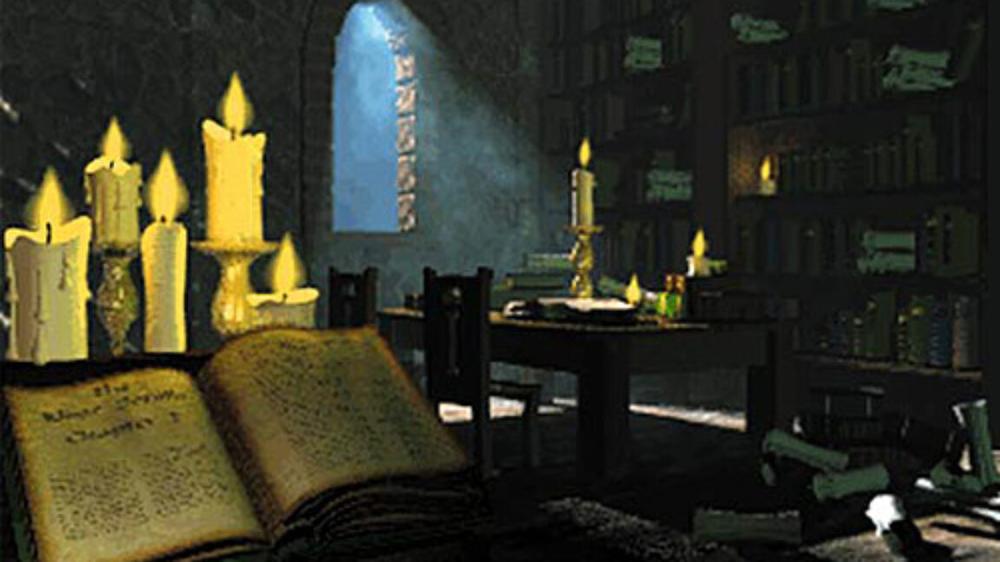Ostensibly, C:\ArsGames is to some extent about actually driving a few game purchases, but in reality it's mostly an excuse for me and my colleagues to wax nostalgic about the games that were formative for us. Case in point: This entry in our ongoing series with GOG is about a game that's completely free. I think Ars can withstand this tiny revenue shortfall for the sake of peak nostalgia!
There are a couple of reasons I chose The Elder Scrolls II: Daggerfall this time around: its co-creator, Julian LeFay, recently passed away, so it seemed timely. Also, it was one of the defining games of my youth—one I have continued to revisit now and then.
But it's also interesting because of where its developer, Bethesda—a studio people both love and hate—is at today. Going back to Daggerfall, we find a game that shows off so much of what we've lost from the bygone era of '90s PC gaming, but also one that makes it abundantly clear why the industry left those sensibilities behind.
I'll spoil the conclusion though: I still love this game. It's profoundly not for everybody, but it's definitely for me.
The kids don’t get it
OK, so we've established that I love Daggerfall. Knowing Ars Technica's readership, some of you probably do too. So who, exactly, doesn't like it?
Just search YouTube and you'll find a bunch of videos with titles like:
- "I FORCED myself to play Daggerfall in 2025"
- "Skyrim Player Tries Daggerfall (It Goes Terribly)"
- "I really tried. But I can't play Daggerfall anymore."
Ouch. That's rough. Granted, one of those isn't actually negative if you sit through the video, but it still acknowledges that it's not easily accessible for everyone.
Look, I get it. Daggerfall hails from an era when "game design" primarily meant "experiment with programming techniques to come up with cool, unproven stuff no one's seen before" rather than "meticulously craft a conveyor belt of nonstop fun via proven formulae."
Those experiments are all exciting and interesting, and it's refreshing to go back to an RPG from this era that was willing to try some wild ideas and deep systems, as opposed to most (not all!) RPGs today, which seem to have the same basic format with talent trees and so on.
I love that Daggerfall includes odd mechanics that you don't often see in RPGs, like climbing. I like its vast world and accurate representation of most wilderness as meaningless liminal space. I think its opaque and sometimes maddening faction reputation systems are fascinating. Its character progression system is detailed and interesting.
For me, the most frustrating aspect to Daggerfall is not its jazzy mechanics. It's the mechanics that aren't explained at all.
For example, in the playthrough I started to refresh my memory for this article, I spent a couple of hours doing quests in Wayrest, one of the most prominent cities in the game. Everything seemed to be fine as I rode my horse around town helping people out, training my skills, and buying new gear. But then a guard ran up to me and arrested me for assault. Who did I assault? I had no idea, but I pled guilty in order to get a softer sentence, even though I was pretty sure I wasn't actually guilty.
I wrote that off as a fluke, but then it happened again: assault. And a third time, again assault. I couldn't fathom why I kept getting arrested.
To DuckDuckGo I went for a quick Internet search to see if anyone else was having this problem. It was pretty common, and the cause was something I never would have imagined: I had been riding my horse around the town, galloping for speed to complete quests faster. It turns out that galloping too close to wandering NPCs in the street registers as assault, with penalties of up to a month in prison and hefty fines.
There was no feedback about this when it was happening. I didn't even know I was doing it. I don't specifically remember having this problem back in the '90s, but it seems likely I did, and I must have just shrugged it off, because back then I would have had no way of figuring out what was going on.
I get why this sort of thing is a big barrier to new players, but I also think some of the YouTubers I watched applied a double standard. One complained that the game doesn't explain itself, but then in the same video extolled the virtues of Minecraft—a game that explains itself even less.
It may be that we're more patient with learning games when we're kids. I played Daggerfall as a kid (well, a young teenager) so I'm relatively chill about its opaqueness and idiosyncrasies. That YouTuber played Minecraft as a kid, so that's the one he's willing to gloss over.
If you're willing to spend a lot of time on wikis (just like with Minecraft) then Daggerfall as a lot to offer to those who are patient. I often feel the most engaging games in the long run are ones that have a steeper learning curve up front.
The unspoken spiritual successor
Of course, it's not just the learning curve or opaque mechanics that are an issue for many players. A lot of people don't like Daggerfall's procedurally generated world and quests—especially players who are used to Skyrim's more hand-crafted environments and quest lines.
Yes, Skyrim has "Radiant Quests," which resemble Daggerfall's. But with the exception of a relatively small number of main story missions, Daggerfall only has what Skyrim calls Radiant quests.
A loose modern analogue to that is Elite Dangerous, which has no meaningful story content at all. Some people might be more comfortable calling that a simulation than a game.
But there's another modern space title that has some strong resemblances to Daggerfall: Bethesda's own Starfield. As with Daggerfall, Starfield has a small cohort of obsessive fans amidst a much larger crowd that thinks it's just terrible.
When people bought Starfield, they were expecting Skyrim in space. I believe that one of the reasons a lot of people were disappointed was that they actually got Daggerfall in space, and that's a very different experience.
Like Daggerfall and Elite Dangerous, Starfield not only accepts but even centers the notion that most of the environments are filled with, well, not a whole lot. It accurately reflects what space or wilderness actually are and makes much of the game a slow-paced mood piece rather than a constant dopamine dispenser.
Most of Starfield's dungeons are randomized. It's more about taking in the vibes and playing with the systems than it is about following an authored narrative—though Starfield does have an authored narrative. (It's just not the game's strongest suit, so it explains why people who are looking for that aren't big fans.)
Granted, there's little crossover between the original Daggerfall team and the folks who made Starfield. Daggerfall was pre-Todd Howard-as-creative-director and pre-Emil Pagliarulo, the two main creative leaders at Bethesda Game Studios since the Morrowind days.
But that's why it's all the more surprising that Starfield is, at best, a hybrid of the sensibilities of Daggerfall and Skyrim. Given those YouTubers trying and failing to play Daggerfall in 2025, it's no wonder that Starfield didn't land for a lot of people.
(I quite like it, personally, but I also like Daggerfall, so I'm either a masochist, old and archaic, or just plain wrong, depending on who you ask.)
A pure expression of one of gaming’s oldest dreams
There has long been a recurring dream in PC gaming of one super game that would allow you to fully live out a particular fantasy life of your choosing. Whether it was intended by developers, promised in marketing, or just in hopeful players' heads, there's an appeal to the idea of living an alternate existence in a sophisticated simulated world that's so immersive in its escapism that you reliably forget your real life for hours on end. The idea is "I want to be a space trader," or "I want to be a wandering fantasy adventurer," and the game gives you a toolkit that's both wide and deep to experience that entirely on your own terms.
A lot of times, the titles that went for this on some level seemed more like simulations than games or stories. They were less consistently fun than other games, but they were often profoundly ambitious.
Since they were all about helping a player live out something in their imaginations, they were also prone to viscerally negative reactions at launch from people who had personal expectations that didn't map to the reality of what a game can actually do or chooses to focus on. (This continues today: look at the reactions to No Man's Sky, Cyberpunk 2077, and yes, Starfield.)
Daggerfall is one of those games. It is not for everybody. But for that niche group of players who are up for something jazzy and simulation-y that takes risks to let them live an alternate fantasy life that's as much in their head canon as on the screen, it's one of the best games of all time.
I strongly believe it's important to judge a game (or any other art or media) more on whether it achieves what it's going for than whether it meets whatever external expectations you might bring to it. If you agree, then that puts Daggerfall in a better position than if you have a more prescriptive attitude about game design.
The fidelity expectations of modern AAA titles and accompanying scope and cost make the kind of experimental, life-sim focus of a game like Daggerfall all but impossible to pursue now, but I miss it. Personally, I'll usually take a deeply flawed work of sheer ambition over a retread of proven ideas I've already experienced before, no matter how skillfully crafted and consistently fun the latter is.
Yeah, I enjoy a good formula game now and then; my point was exactly that when I wrote about Assassin's Creed Shadows a few months ago. But as much as I have enjoyed Shadows, it won't stick with me for 30 years. Daggerfall has, and revisiting it this week, I can see that's not purely because of nostalgia. It represents a maximalist philosophy of game design I feel is sorely underrepresented in today's market.
If that's your inclination, too, it's worth giving Daggerfall a shot. Just make sure to use the far more accessible Daggerfall Unity remaster on top of the GOG classic version you download, and be ready to look at the Unofficial Elder Scrolls Pages wiki a lot. Make sure you have a couple hundred hours to kill, too.
Oh, that's all, eh? Hey, you could always make it a project in your retirement.
Ars Technica may earn compensation for sales from links on this post through affiliate programs.

 Where is Elmer Wayne Henley now? Update on The Serial Killer’s Apprentice
Where is Elmer Wayne Henley now? Update on The Serial Killer’s Apprentice